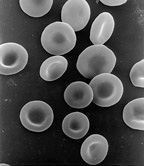
Photo from wikipedia
Late-preterm infants (LPT) are at increased risk for long-term neurodevelopmental sequelae and iron deficiency. The aim of the study is to assess the positive effect of iron supplementation on psychomotor… Click to show full abstract
Late-preterm infants (LPT) are at increased risk for long-term neurodevelopmental sequelae and iron deficiency. The aim of the study is to assess the positive effect of iron supplementation on psychomotor development in healthy LPT. We designed a randomized placebo-controlled double-blind trial dividing the newborns into two groups. Every patient was assessed using the Griffiths Mental Development Scales (GMDS)-II edition at 12-month post-conceptional age. The study was performed at the Neonatology Unit of our Hospital, in Italy. Sixty-six healthy LPT infants born between 340⁄7 and 366⁄7 weeks of gestational age were enrolled in the study. One group received martial prophylaxis from the third week of life to 6 months of post-conceptional age (2 mg/kg/day of iron pidolate), the other received placebo. Fifty-two of the enrolled infants were assessed using the GMDS at 12-month of post-conceptional age. Statistical analysis of the mean scores of the Griffiths subscales was performed. There was a difference in the mean developmental quotient (DQ) (p < 0.01) between the two groups: iron group mean DQ 121.45 ± 10.53 vs placebo group mean DQ 113.25 ± 9.70. Moreover, mean scores of the Griffiths subscales A, B, and D showed significant differences between the two groups (scale A p < 0.05, scale B p < 0.02, scale D p < 0.01, respectively). Conclusions: We recommend that all LPT neonates receive iron supplementation during the first 6 months of life in order to improve their 1-year neurodevelopmental quotient. What is Known: • Late-preterm infants (LPT) are at increased risk for long-term neurodevelopmental sequelae and also for iron deficiency. • Iron deficiency is an independent risk factor for adverse neurological outcomes. What is New: • Healthy late-preterm who received iron supplementation during the first 6 months of life achieved better neurological outcomes at 12-month post-conceptional age than LPT who received placebo. • Our study strongly supports the need for the implementation of martial prophylaxis in LPT neonates. What is Known: • Late-preterm infants (LPT) are at increased risk for long-term neurodevelopmental sequelae and also for iron deficiency. • Iron deficiency is an independent risk factor for adverse neurological outcomes. What is New: • Healthy late-preterm who received iron supplementation during the first 6 months of life achieved better neurological outcomes at 12-month post-conceptional age than LPT who received placebo. • Our study strongly supports the need for the implementation of martial prophylaxis in LPT neonates.
Journal Title: European Journal of Pediatrics
Year Published: 2021
Link to full text (if available)
Share on Social Media: Sign Up to like & get
recommendations!